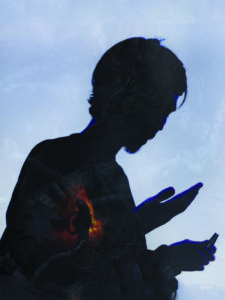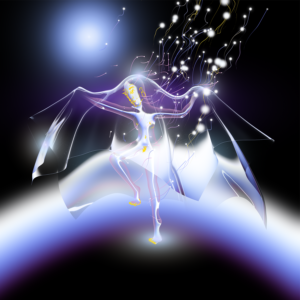Private Selection Records has served the techno community through its releases, mixes and visuals since 2013. The label is based in Los Angeles and co-founded by Jesse Pimenta, aka Dreams, Kyle Hamon, aka Arkitect, Devin Ronneberg, aka Aerial, and Aron Johnson, aka Crash Override. Two years after establishing themselves, Private Selection began throwing recurring parties, earning the label a dedicated following and level of mystique by organizing roughly four parties a year, while hosting radio shows on Dublab and NTS. Headliners such as Tzusing, Lee Gamble, and NGLY are testaments to Private Selection’s growth, booking rising artists as well as established ones. They’ve maintained a reputation as a no-nonsense and subversive collective, eschewing almost all press and favoring a more caustic, experimental and stripped-down approach to techno.
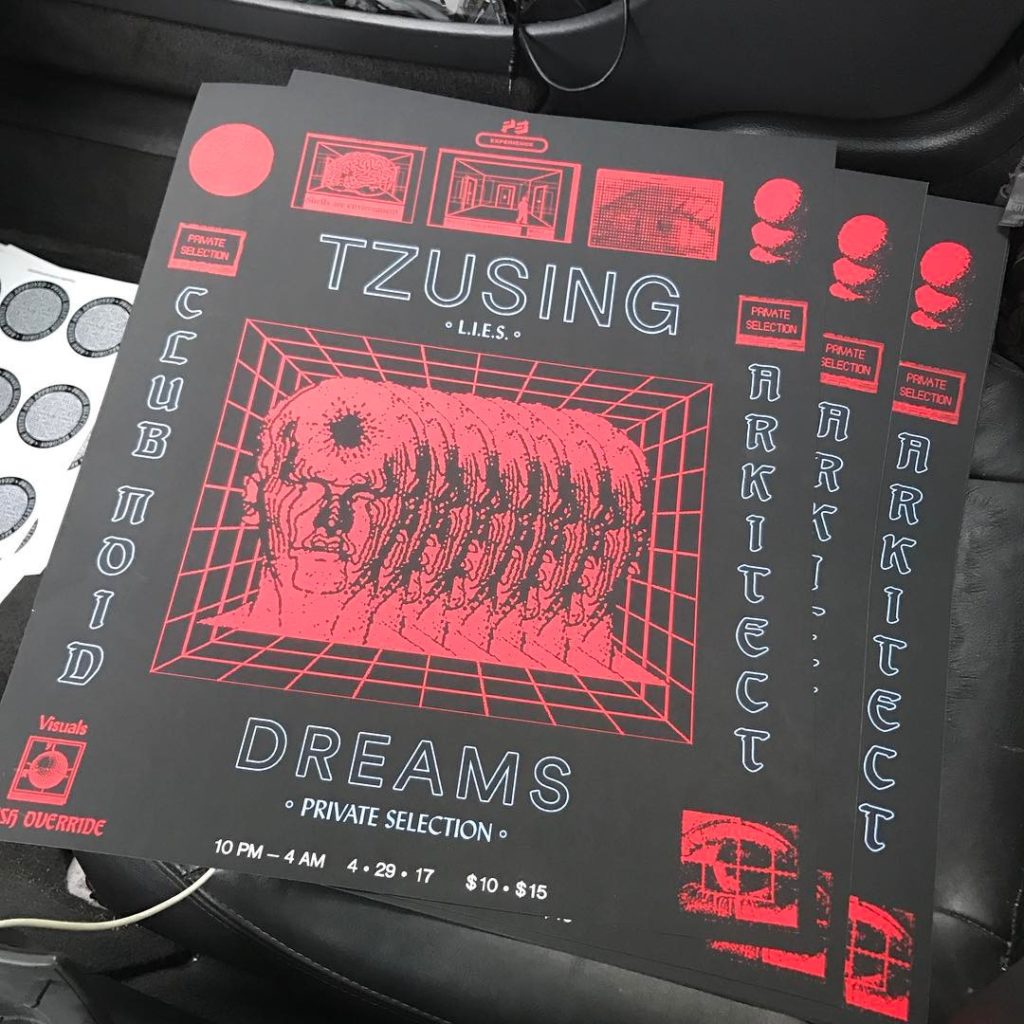
While parties and rave spaces have historically represented resistance, today their means of promotion is often anything but an act defiance. Social media platforms that have mastered surveillance and data-harvesting are now the primary conduits through which hype and documentation is generated. Understandably, their audiences are massive. Boiler Room, for instance, boasts a following of 561,000 on Instagram and 2.6 million on Facebook. Their mission to “broadcast the underground” and livestream parties for viewers to experience through the intimacy of their devices borders on hyperreality.
Private Selection is realistic about their label’s presence on social channels and online ticketing sites for parties — but they don’t waive their self-subsistence either. Ronneberg developed an alternative ticketing system on the website. Most importantly, the label defends the tangibility and agency of the printed party flyer, which Pimenta designs. Private Selection prints and sells these flyers to attendees as souvenirs. The party’s latest iteration on July 14, which saw L.I.E.S. Records affiliate Florian Kupfer headline, even handed out corresponding collectible tickets to the first 100 guests, referencing an item largely replaced by a smartphone barcode.
Following the show Kupfer and the Private Selection crew convened at Ronneberg and Johnson’s apartment in the Highland Park neighborhood of Los Angeles to lounge in the living room with the ambient rush of the 110 freeway outside. Here, they talk about the implications and significance of producing physical party ephemera in the shadow of digital dominance, and the effect it has on its audience.
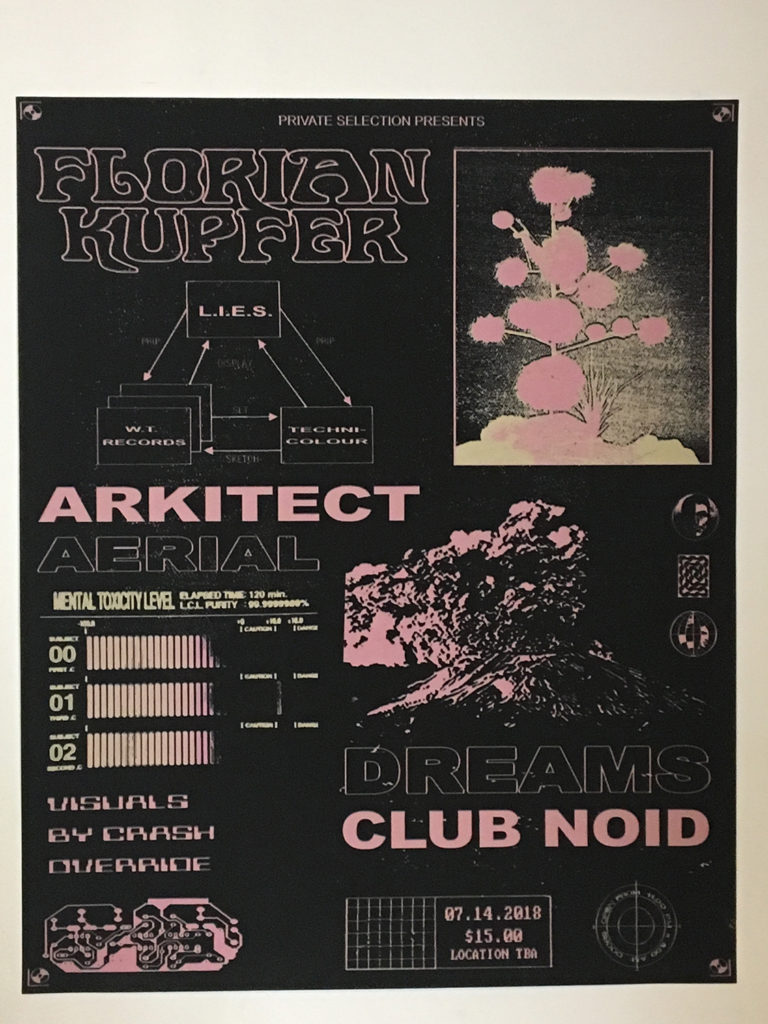
**The show last night was a huge success. Florian, how did your night go? I know you’ve played in L.A before, how did this feel in comparison to your last set a few months ago?
Florian Kupfer: Well, last night just felt much more intimate. You’d see pockets of friends hanging out and it just had a very friendly environment. People came together to hang out and not just see somebody DJ. There was no pressure. That, for me, was the biggest difference between this show and the show before. My night went super well. I didn’t even realize I was finished, I had to give it up to the next DJ.
Kyle Hamon: I think the energy was the main part that contributed to the success of the party. People have fun, people feel comfortable and that in itself lends itself to a successful party. If people can feel comfortable, then they keep coming back and you get more people that are there for the right reasons. We have a zero tolerance towards people that will ruin that.
**It’s a trusted network.
KH: They trust us and we trust them to not be super crazy and ruin other people’s times. It’s a very trusting environment and that’s cool.
**Along with Lee Gamble, Buttechno, NGLY and Tzusing, Florian’s the latest artist who’s had physical posters printed for a Private Selection show. One thing I’ve always noticed in Europe, Berlin particularly, is the omnipresence of flyers emblazoned on walls and lampposts. Here in LA, promotion and flyers are almost strictly relegated to the digital realm.
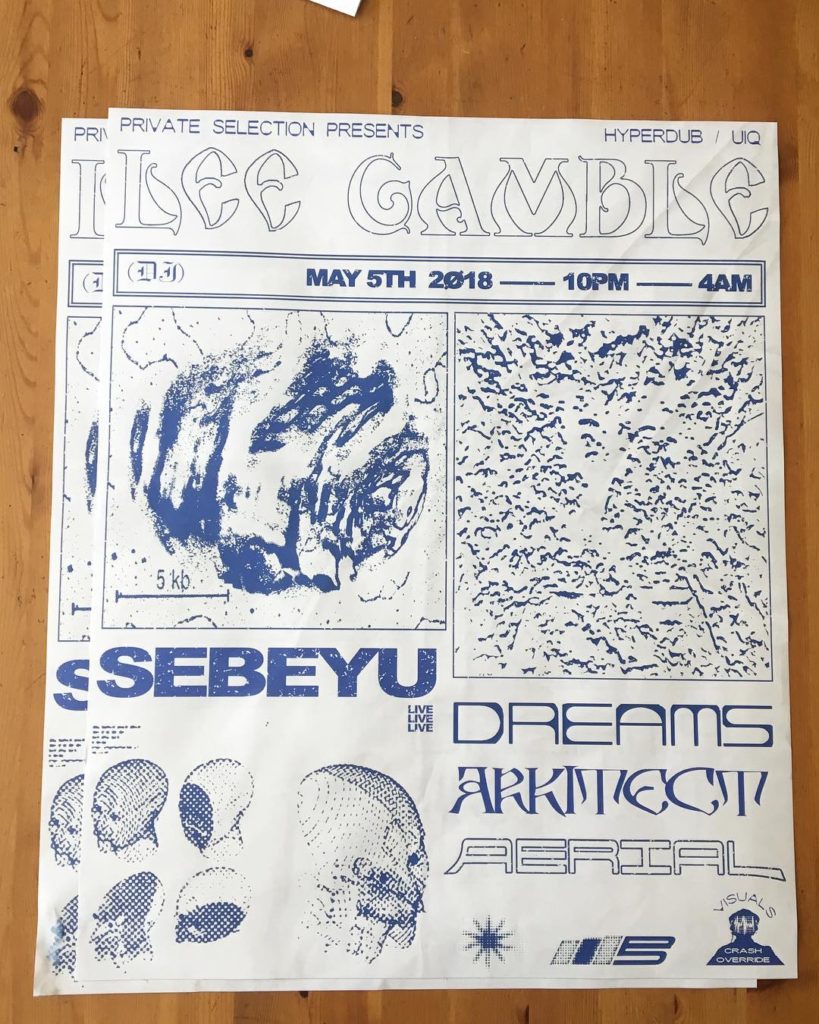
KH: I think what plays into that is LA being so much a car culture, and being so spread out. There’s not much foot traffic.
FK: So, you don’t actually stop to look at flyers.
KH: When we print out posters, a lot of it is for people to take home but also to throw up in a record store where people who were actually present at the party could see it.
Jesse Pimenta: Definitely. I think it’s nice to not necessarily rely on Facebook for your only information about a party. But we’re limited to different means of promotion with the way that the world is working, so we have to work with it. But it’s interesting to backtrack and start out with the original way it was done before there was internet. Having the original idea come out onto a piece of paper is very different than scrolling by a post.
KH: On Facebook, once the event’s over, so is the flyer, so is the artwork. Once the event’s over, it kind of gets deleted in history. I think people appreciate something that they can take home and remind themselves of a good time they had.
**Jesse, I want to reference a post you made on Facebook. Underneath the flyers for the Florian Kupfer show, you wrote, ‘Immortalize your club memories’. And I think that’s what it’s all about: creating memorabilia. We’re so prone to see a social media post and consciously or subconsciously delete it from our minds based on their impalpable nature.
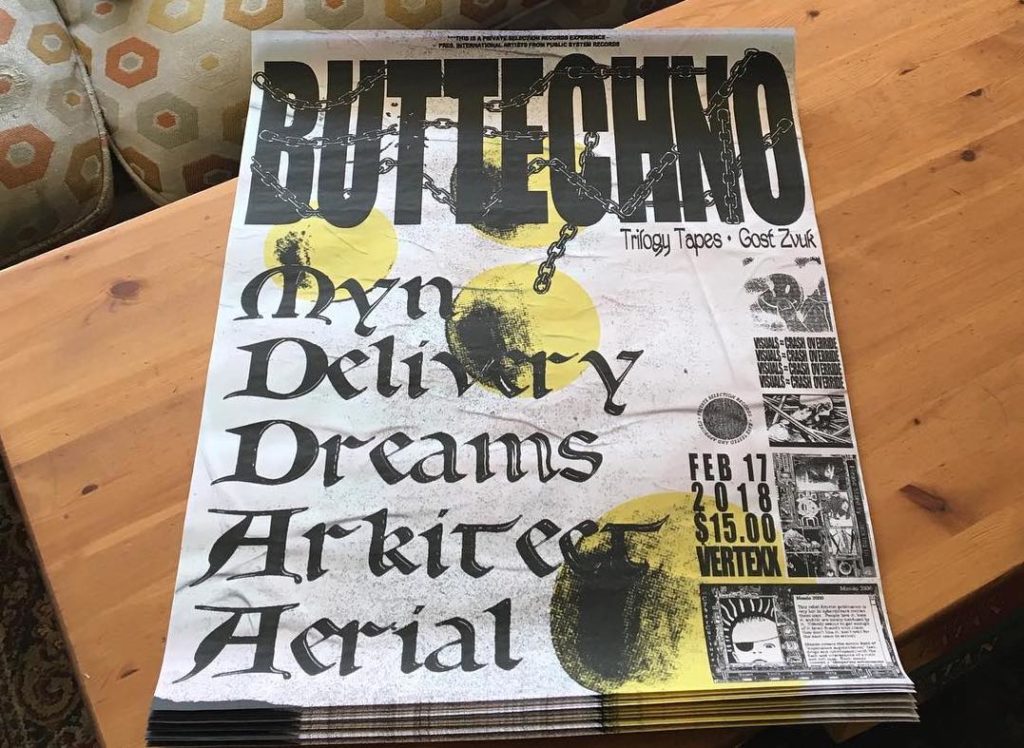
JP: For me, I feel the better the art, the more I trust whomever’s commissioning or making that art, and that they’re going to provide me with an equally satisfying experience. So when you see that low effort put into something, you assume maybe the party will reflect that.
FK: I feel like it’s either no artwork at all, and you just know the content is really good, or it’s both.
**They are so inextricably linked. It’s one’s first impression.
FK: During the season, I work for an organic wine farmer in the west of Germany and I really love this guy. Once I asked him, ‘How would I go about buying a good bottle of wine without really knowing about wine?’ and he said, ‘If you go to a store, and you look at the covers of the bottles, you can almost always tell’. If somebody cares about their label they’ll most likely care about what’s inside the bottle as well. So you can’t judge a book by its cover… but you also can [laughs].
Devin Ronneberg: Jesse’s done a great job of matching the posters to the vibe that we’re trying to present. It’s hard to pinpoint what exactly but it’s a futuristic, apocalyptic, optimistic sort of approach. There are all these references to technology.
KH: It all boils down to appreciation. They’re so many apps on your phone to make a quick flyer, and people really recognize when there’s actual work put into it.
JP: I’ve seen beautiful flyers being made for years before we were even doing anything and I wonder why it isn’t being done more now. You could just look at a flyer and say, ‘Wow I wish I was there… that looks fun’. You could just tell how good it was because of the flyer. That’s what I want to make. I want to make flyers where, in 20 years someone’s like, ‘Damn that must’ve been crazy…”
**In addition to flyers, you also printed these beautifully-rendered tickets for the first 100 attendees of Florian’s show in July, what was the motivation behind that?
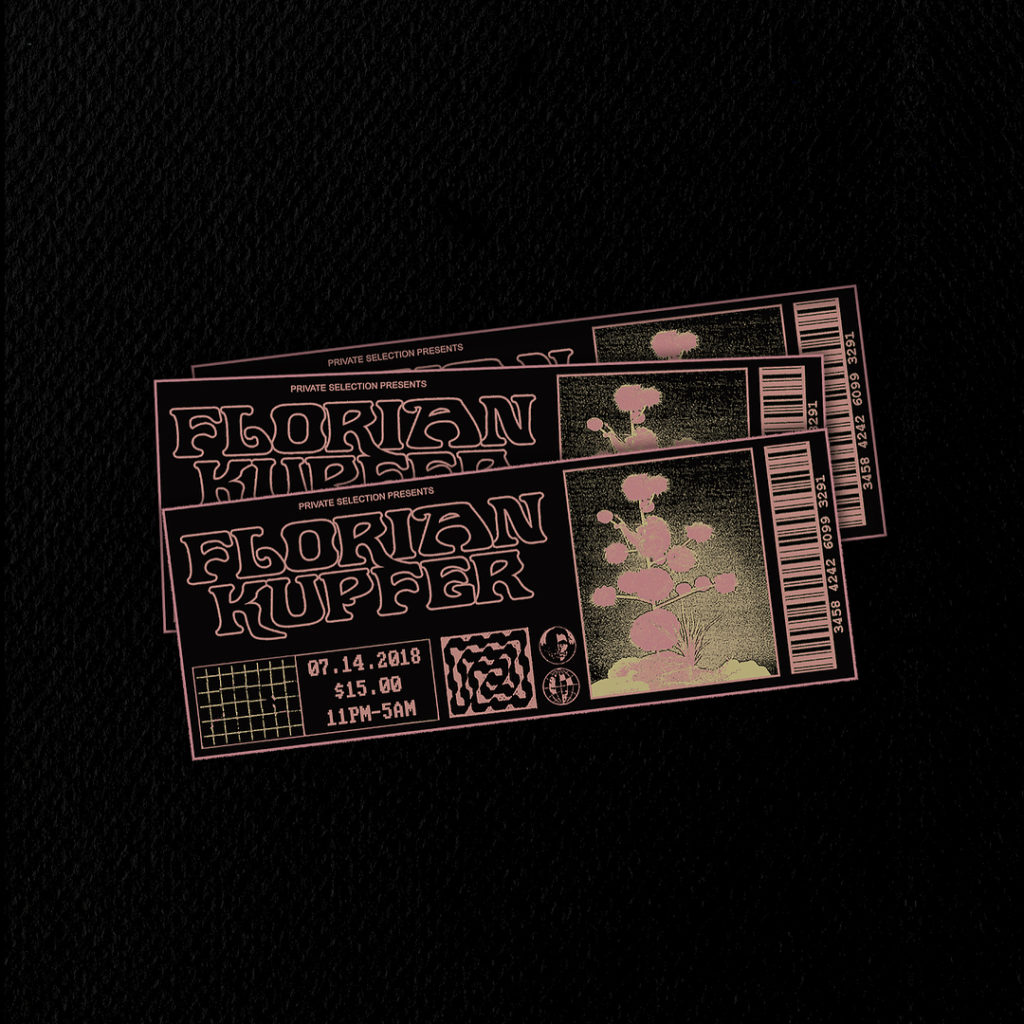
JP: We thought it was cool to have something to go home with. When you leave a party, you feel like shit the next day, and you go on with your life — but at least you have this little ticket, this token. It’s fun to figure out ways to motivate people to be involved with the party in more than just attending. It can be a culture and it can be creative, something worth remembering, something more than just a nightlife.
DR: And along with posters, the whole concept of the ticket is slowly being lost. For instance, most people showed up with their phone and scanned the barcode.
KH: Thirty years will go by and you can forget about the party but then seeing that ticket might spark, might re-introduce you to that music.
**Posting show flyers and self promotion on digital spaces can often feel bizarre and even boastful. In a way, the practice of designing and producing party ephemera for guests feels like giving back.
JP: That’s the whole point. We see so many parties around us that seem purely capitalistic and not about the curation — just hopping onto whatever will generate the most money. We’re asking: ‘what can we actually give to people so that they keep coming back, they feel grateful, they don’t feel ripped off?’
DR: For some people who throw parties in LA, there are crews that operate in a self-aggrandizing way, where they distance themselves from the people that they provide the service to. We’re trying to do the opposite. Instead of the audience being here for us, we’re really there for them. Giving them something back is part of the mentality of them feeling valued in that space.
**Much of Private Selection’s success can be attributed to its commitment to the LA underground and the DIY spirit you celebrate. Do you think your flyers and tickets reflect that?
DR: We try to DIY on all aspects. Even the way people are buying tickets and signing up on our online site, I made that. I was trying to do something special than whatever ticket website you go on. You feel like you’re interacting with something that somebody spent time on. So posters are just an extension of that. There’s the web, there’s the posters, there’s the tickets. The parties themselves are the ultimate extension of that.
JP: We’re all super conscious of the age we’re living in. We all work with technology in our daily lives, so we try to express individually who we are.
**Do you think that creating your own platform to sell tickets, as opposed to a service that gets a percentage, is resistance to larger structures? Or that designing and printing flyers, where significance lies in palpable memorialization, is resistance to our digital hegemony?
JP: All flyers feel like they’re a piece of art. I try to make it like a piece of art you want to hang up. To me, the art communicates so much more when you actually have it with you, as opposed to looking at it in a little square post. It’s so inconsequential when you see something and go ‘Oh nice. Next post’ on your phone. It’s why people collect records as a passion because you feel like you’re actually holding onto this music, where when you download music you forget that you even have it in your library.**

